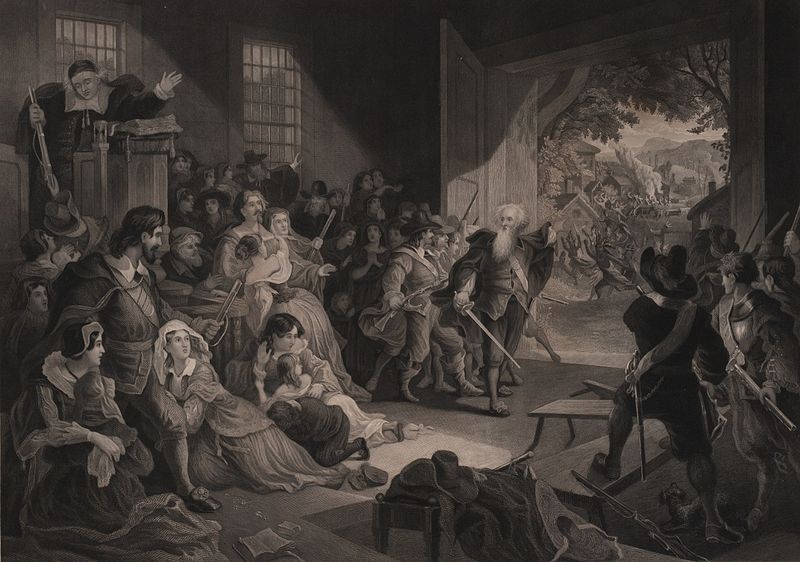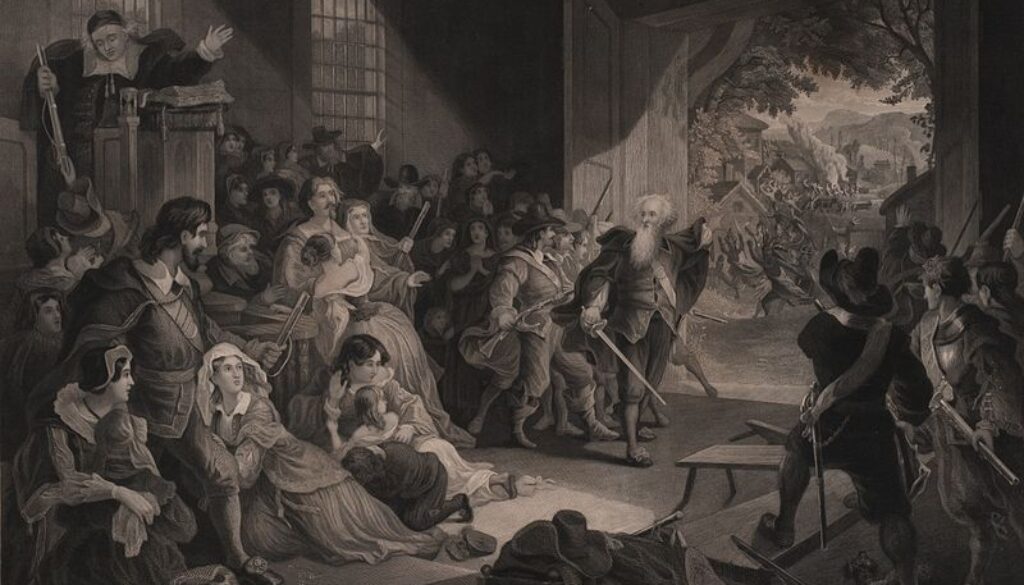The Angel of Hadley
On the morning of September 1, 1675, the residents of Hadley, a town of some fifty families, were gathered in their newly built meetinghouse. They had settled the town in 1659, having left Connecticut because of a dispute about the ritual of baptism.
 At first their pastor, the Rev. John Russell, (Harvard ‘45) preached in private homes until the meetinghouse was built. His salary was often paid in wheat, peas, or corn.
At first their pastor, the Rev. John Russell, (Harvard ‘45) preached in private homes until the meetinghouse was built. His salary was often paid in wheat, peas, or corn.
I learned all this from Edward Lodi’s book, “The Angel of Hadley, A Legend of King Philip’s War,” which I shelled out seven bucks for at the Hadley Library Book Sale, unheard of, for me, but chalk it up to a good cause.
And I got more than my money’s worth, much more. Lodi continues, “Such, no doubt was the scene on September 1, 1675, when the good folk, men, women and children of Hadley, were assembled in the meeting house, the only absentees the handful of men posted outside as sentries.
The ablebodied men, as then required by law, were of course well armed, and with good cause. Trouble was afoot.”
In June, nine settlers had been killed in Swansea. In August, Brookfield was attacked and burned and seven settlers were killed in Lancaster.
This was only a prelude to the deadliest war, for civilians, in the history of our country, King Philips’ War, but that’s another story for another time. Back to September 1, 1675 in Hadley as described by Edward Lodi, a slightly cheerier story with no casualties:
“Whatever thoughts and emotions – fear, faith, hope, or dread – were going through the minds of the people of Hadley as they sat and listened to the pious words spoken to them from the pulpit by the Reverend John Russell, their worst fears were realized when the unmistakable sounds of attack, shouts, war whoops, and musket fire, interrupted the sermon and assailed their ears.
“Understandably, they would have been terrified; some, no doubt, realizing their vulnerability, would have panicked. Save for the besieged sentinels. Every inhabitant of this remote frontier community, man, woman, child, was crowded into this cramped wooden building, which the Indians, with their flaming arrows, could easily surround and set afire.
“Inside, all was confusion. Outside, their homes, their crops, their livestock, the very things they depended upon for their survival, were about to be destroyed. Worse, they themselves were likely soon to be slaughtered.
“Suddenly a stranger appeared among them. Whence he had come, none could say. Later, they would reflect upon his clothing, his manner of speech – hadn’t there been something slightly odd about these, something foreign about these, something foreign, perhaps, or archaic? – but at the moment what impressed them most was his mien, his military bearing, his air of authority, as if he had long been accustomed to command, and to have those commands obeyed.
“Obviously he had knowledge of warfare, for he immediately took charge of the situation, and organized the men into groups and assigned them to tasks, some to remain within to protect the women and children, some to go outside and take up defensive positions, others to follow him and, on the offensive, confront the attackers and drive them off.
“And this they did. Discouraged, perhaps, by the settlers’ organized resistance and stour defense, so unexpected,the Indians eventually gave up their assault to withdraw back into the wilderness, and the settlement was saved.
“And as suddenly as he he appeared, the mysterious stranger – the white-haired gentleman, who with his military bearing, his calm demeanour, had rallied the townspeople, skillfully grouped them, and with whom they had sallied forth to repel the heathen, thus preserving them from almost certain destruction – vanished.
“Seek as they might, the townspeople could find no sign of him. It was as though he had not been a man at all, but instead an emissary from Heaven, sent by God to save them in their hour of direst need.”
Now you can believe that, or you can believe that the Angel of Hadley was a wily old general from the English civil war with a 100-pound price on his head who had been living for more than ten years in a cellar in the Rev. John Russell’s house because he was a regicide, one of the judges who had signed the death warrant of Charles I.
It’s a great story, worth at least seven bucks. Heck that’s a gas station chicken salad sandwich.
